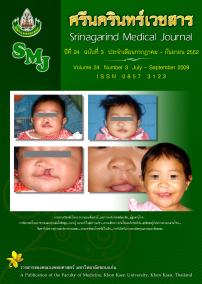ThaiScience
ThaiScience
SRINAGARIND MEDICAL JOURNAL
Volume 35, No. 02, Month MARCH, Year 2020, Pages 129 - 134
Effect of paraquat on interferon-gamma production by t cell
Surachat Buddhisa, Patcharaporn Tippayawat, Rungnapa Sranujit, Nattaphol Prakobkaew
Abstract Download PDF
Background and objective: Paraquat is one of the most widely used global herbicides for weed control. Recently, paraquat has been reported to have immune toxic effects in animal models, while effects on human T cell function remain undetermined. To resolve these issues, the effects of paraquat on IFN-γ production by human T cells in vitro were evaluated. Methods: Peripheral blood mononuclear cells were co-cultured with various concentrations of paraquat dichloride or phytohemagglutinin (PHA). Cell viability was determined by trypan blue exclusion and relative metabolic activity was assayed by MTT method. IFN-γ production was measured after co-culture with phytohemagglutinin by ELISA. Results: Paraquat at 100 μg/mL did not affect cell viability, whereas 300 μg/mL paraquat significantly reduced the percentage of viable cells compared with the control (p< 0.05). Addition of 100 and 300 μg/mL of paraquat significantly increased the percentage of IFN-γ production inhibition compared with the control (p< 0.05). Moreover, inhibition of IFN-γ production by paraquat was observed after 24 h co-culture and showed a robust effect in all individuals after 48 h co-culture.Conclusion: Data indicated that paraquat at the concentration of 100 and 300 μg/mL had an inhibitory effect on IFN-γ production by T cells. Thus, direct contact with paraquat or paraquat contaminated environments and agricultural products increased risk of diseases caused by T cell dysfunction
Keywords
Paraquat T cell Interferon-gammaSRINAGARIND MEDICAL JOURNAL
Published by : Faculty of Medicine, Khon Kaen University
Contributions welcome at : http://www.smj.ejnal.com/e-journal/journal/index.php
